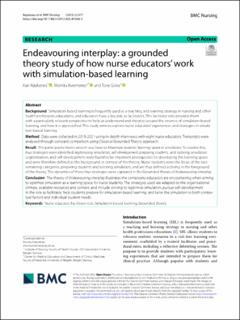| dc.contributor.author | Røykenes, Kari | |
| dc.contributor.author | Kvernenes, Monika | |
| dc.contributor.author | Giske, Tove | |
| dc.date.accessioned | 2024-02-13T13:27:03Z | |
| dc.date.available | 2024-02-13T13:27:03Z | |
| dc.date.created | 2023-11-09T11:24:08Z | |
| dc.date.issued | 2023 | |
| dc.identifier.issn | 1472-6955 | |
| dc.identifier.uri | https://hdl.handle.net/11250/3117333 | |
| dc.description.abstract | Background
Simulation-based learning is frequently used as a teaching and learning strategy in nursing and other health professions educations, and educators have a key role as facilitators. This facilitator role provides them with a particularly relevant perspective to help us understand and theorize around the essence of simulation-based learning, and how it is approached. This study aims to explore nurse educators’ experiences and strategies in simulation-based learning.
Method
Data were collected in 2018-2021 using in-depth interviews with eight nurse educators. Transcripts were analysed through constant comparison using Classical Grounded Theory approach.
Result
The participants' main concern was how to Maximize students' learning-space in simulation. To resolve this, four strategies were identified: legitimizing simulation, self-development, preparing students, and tailoring simulation. Legitimisation, and self-development were found to be important prerequisites for developing the learning space and were therefore defined as the background or context of the theory. Nurse students were the focus of the two remaining categories, preparing students and tailoring simulation, and are thus defined as being in the foreground of the theory. The dynamics of these four strategies were captured in the Grounded theory of Endeavouring interplay.
Conclusion
The theory of Endeavouring interplay illustrates the complexity educators are encountering when aiming to optimize simulation as a learning space for nurse students. The strategies used are adapted to the organisational climate, available resources and context, and include striving to legitimize simulation, pursue self-development in the role as facilitator, help students prepare for simulation-based learning, and tailor the simulation to both contextual factors and individual student needs. | en_US |
| dc.language.iso | eng | en_US |
| dc.publisher | BMC | en_US |
| dc.rights | Navngivelse 4.0 Internasjonal | * |
| dc.rights.uri | http://creativecommons.org/licenses/by/4.0/deed.no | * |
| dc.title | Endeavouring interplay: a grounded theory study of how nurse educators’ work with simulation-based learning | en_US |
| dc.type | Journal article | en_US |
| dc.type | Peer reviewed | en_US |
| dc.description.version | publishedVersion | en_US |
| dc.rights.holder | Copyright 2023 The Author(s) | en_US |
| dc.source.articlenumber | 377 | en_US |
| cristin.ispublished | true | |
| cristin.fulltext | original | |
| cristin.qualitycode | 1 | |
| dc.identifier.doi | 10.1186/s12912-023-01546-9 | |
| dc.identifier.cristin | 2194466 | |
| dc.source.journal | BMC Nursing | en_US |
| dc.identifier.citation | BMC Nursing. 2023, 22, 377. | en_US |
| dc.source.volume | 22 | en_US |

